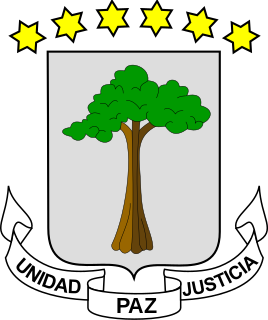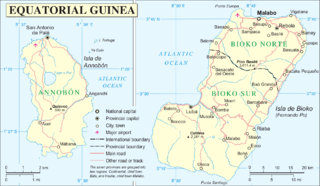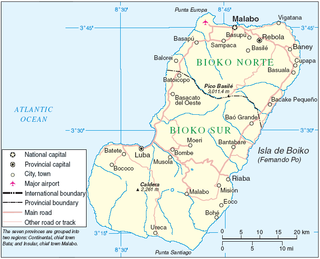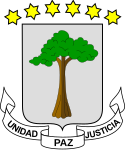
Equatorial Guinea, officially the Republic of Equatorial Guinea, is a country located on the west coast of Central Africa, with an area of 28,000 square kilometres (11,000 sq mi). Formerly the colony of Spanish Guinea, its post-independence name evokes its location near both the Equator and the Gulf of Guinea. Equatorial Guinea is the only sovereign African state in which Spanish is an official language. As of 2015, the country had a population of 1,225,367.

The History of Equatorial Guinea is marked by centuries of colonial domination by the Portuguese, British and Spanish empires, and by the local kingdoms.
This article is about the demographic features of the population of Equatorial Guinea, including population density, ethnicity, education level, health of the populace, economic status, religious affiliations and other aspects of the population.

The politics of Equatorial Guinea take place in a framework of a presidential republic, whereby the President is both the head of state and head of government. Executive power is exercised by the government. Legislative power is vested in both the government and the Chamber of People's Representatives

This article lists transport in Equatorial Guinea.

Malabo is the capital of Equatorial Guinea and the province of Bioko Norte. It is located on the north coast of the island of Bioko, formerly known by the Bubis, its indigenous inhabitants, as Etulá, and as Fernando Pó by the Europeans. In 2018, the city had a population of approximately 297,000 inhabitants.

Teodoro Obiang Nguema Mbasogo is an Equatoguinean politician who has been President of Equatorial Guinea since 1979. He ousted his uncle, Francisco Macías Nguema, in an August 1979 military coup and has overseen Equatorial Guinea's emergence as an important oil producer, beginning in the 1990s. Obiang was Chairperson of the African Union from 31 January 2011 to 29 January 2012. He is the second longest consecutively serving current non-royal national leader in the world.

Francisco Macías Nguema was the first President of Equatorial Guinea, from 1968 until his overthrow and subsequent execution in 1979.

The Bubi people are a Bantu ethnic group of Central Africa who are indigenous to Bioko Island, Equatorial Guinea. Once the majority group in the region, the population experienced a sharp decline due to war and disease during Portuguese expeditions. By the end of Spanish colonial rule in the mid 20th century, and after substantial intermarriage with newly introduced populations, such as Afro-Cubans, Krio people, Portuguese people and Spaniards, the Bubi people, again, experienced a great decline in number. Seventy-five percent perished due to tribal/clan rooted political genocide during a civil war that led to Spanish Guinea's independence from Spain. This, too, sparked mass exodus from their homeland with most of the exiles and refugees immigrating into Spain. The indigenous Bubi of Bioko Island have since co-existed with non-indigenous Krio Fernandinos; and members of the Fang ethnic group, who have immigrated in large numbers from Río Muni. Once numbering approximately 3 million, the Bubi currently number around 100,000 worldwide.

The Movement for the Self-Determination of Bioko Island is a proscribed political organization in Equatorial Guinea. It has its roots in the pre-independence Unión Bubi, which sought independence from the mainland half of Spanish Guinea. It is supported by the Bubi ethnic group, which dominates Bioko island.
The Lengue language, also called Molengue, Balengue, Molendji, is a Bantu language of southern Equatorial Guinea, spoken by the Lengue people between Bata and the Gabon border near the coast. The speakers have come under increasing Fang influence. The Ethnologue describes it as a member of the B subgroup of Northwest Bantu, while Echegaray is more specific, saying that it is linguistically a member of the Sheke group :

Annobón, also spelled Anabon and formerly as Anno Bom and Annabona, is a province of Equatorial Guinea consisting of the island of Annobón and its associated islets in the Gulf of Guinea and Atlantic Ocean's Cameroon line. The provincial capital is San Antonio de Palé on the north side of the island; the other town is Mabana, formerly known as San Pedro. The roadstead is relatively safe, and some passing vessels take advantage of it in order to obtain water and fresh provisions, of which Annobon has offered an abundant supply. However, there is no regular shipping service to the rest of Equatorial Guinea, and ships call as infrequently as every few months. According to the 2015 census it had 5,314 inhabitants, a small population increase from the 5,008 registered by the 2001 census. The official language is Spanish but most of the inhabitants speak a creole form of Portuguese. The island's main industries are fishing and forestry.

The Chamber of Deputies is the lower house of the Parliament of Equatorial Guinea.

Black Beach, located on the island of Bioko, in the capital city of Malabo in Equatorial Guinea, is one of Africa's most notorious prisons. The prison was built in the 1940s during the time of the Spanish colonial rule. At first common criminals were imprisoned here, but after the independence of the country in 1968 and the establishment of the dictatorship of Francisco Macías Nguema, many political opponents were imprisoned and killed in prison. Among them, Bonifacio Ondó Edu and Edmundo Bossio.

The Insular Region of Equatorial Guinea comprises the former Spanish territory of Fernando Po, together with Annobón island, the latter formerly part of the Spanish territory of Elobey, Annobón and Corisco, which was located in the Gulf of Guinea and in the Corisco Bay.

Equatorial Guinea was the only Spanish colony in Sub-Saharan Africa. During its colonial history between 1778 and 1968, it developed a tradition of literature in Spanish, unique among the countries in Africa, that persists until the present day.
Francisco Malabo Beosá or King Malabo II, was an African monarch, born on the island of Fernando Po in Spanish Guinea, was the son of former Bubi king Malabo Lopelo Melaka and the last legitimate successor of the Bubi Kingdom.

Vice President of Equatorial Guinea is the second highest political position obtainable in Equatorial Guinea. Following the 2011 constitutional reform, there is a provision for two Vice Presidents who are appointed by the President of Equatorial Guinea.

Bioko is an island 32 km (20 mi) off the west coast of Africa and the northernmost part of Equatorial Guinea. Its population was 335,048 at the 2015 census and it covers an area of 2,017 km2 (779 sq mi). The island is located off the Ambazonian segment Cameroon, in the Bight of Bonny portion of the Gulf of Guinea. Its geology is volcanic; its highest peak is Pico Basile at 3,012 m (9,882 ft).

The Supreme Military Council — initially called the Military Revolutionary Council — was the ruling military junta and the de facto government of Equatorial Guinea between the 1979 coup d'état and the 1982 constitutional referendum.













